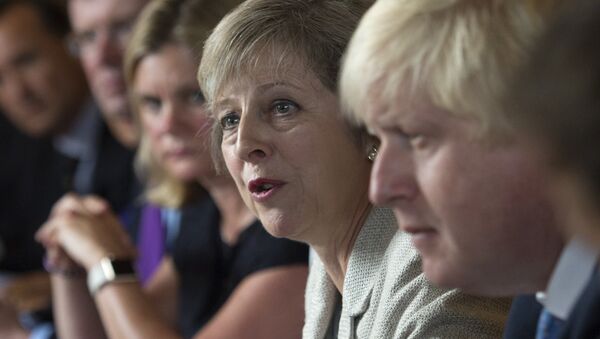British Prime Minister Theresa May is to hold a crucial meeting of her Cabinet at Chequers today in an attempt to find final agreement on what sort of economic relationship Britain is to have with the European Union after it leaves in March 2019.
Today's meeting at Chequers isn't about the future of Britain. It's about Theresa May seeking to placate a group of 70 very right wing MPs — that the Tory government might not collapse and she might stay in power.
— Otto English (@Otto_English) July 6, 2018
The Prime Minister has repeatedly committed her government to withdrawing the UK from the European Customs Union as well as the Single Market and the jurisdiction of the European Court of Justice, as laid out in her 2017 Lancaster House speech.
With her own leadership potentially hanging on the result of the meeting, the PM has developed a so-called "third way" compromise, in an attempt to prevent a Cabinet split that could bring her down and collapse the government as well.
The compromise agreement reportedly would enable Britain to set its own trade tariffs but continue to collect duties on behalf of Brussels through a "facilitated customs arrangement," that would rely on as-yet unspecified technology to apply the correct tariff depending on where products are destined. Such as a solution could also avoid the need for customs checks at the Northern Irish border which has been among the most serious long-running sticking points between London and Brussels.
Fascinating @Peston note detailing the third way Brexit plan Theresa May is preparing for Chequers on Friday.
— Sebastian Payne (@SebastianEPayne) July 3, 2018
If he's right, we're definitely on course for the softest possible hard Brexit. Much for true believers to be unhappy about. https://t.co/BxPNEForeU
What is Theresa May's 'third way' Brexit plan that Cabinet ministers will argue over at Chequers tomorrow?https://t.co/zA67AB1HcB pic.twitter.com/lrEm8YOxdH
— ITV News (@itvnews) July 5, 2018
Britain would also retain a "common rulebook" with Europe on industry standards, or what has also been called "regulatory alignment" and which "hard Brexiteers" have dismissed as Britain remaining in the Single Market in all but name. Such alignment would include penalties for "regulatory divergence" but leave Britain some room to strike independent trade deals outside the European Union.
Mrs May has spent much of the last year caught in an escalating battle between opposing camps of her Cabinet, those who want to retain as close an economic relationship with Europe as possible, led by Chancellor of the Exchequer Phillip Hammond, and those wanting a complete economic and political separation, led by Brexit Secretary David Davis and International Trade Secretary Liam Fox.


